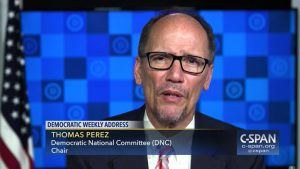
Throughout the past ten years, Democratic politicians have increasingly relied on the term “centrism” as a euphemism for “corporatism”. As centrism has been replaced by adherence to corporatism, it has become difficult to identify any politician who advocates centrist views. Republican politicians are too afraid of offending their party’s “base”, whose opinions are shaped by the Trump/Fox News axis. By now, nearly all Democrats who identify as centrists are actually corporatists.
During the current campaign cycle, the Democratic National Committee (DNC) and most mainstream news outlets have advanced the cause of promoting a “centrist” presidential candidate as the best route for defeating Donald Trump in 2020. The chant, “Vote Blue no matter who” seems to mean “Shut up and vote for the corporatist, designated as your candidate by the DNC”.
In a recent interview, Michael Moore explained that the majority of Americans agree with the progressive Democrats who support “Medicare for all”, increased measures to limit climate change, increasing the minimum wage and reducing this nation’s absurd incarceration levels. Moore emphasized that a significant majority of the American people hold views to the left of what mainstream news outlets define as “the center”.
Moore’s point is now reverberating through news reports, which acknowledge voters’ increasing support for Bernie Sanders. On December 26, The New York Times ran a piece by Sydney Ember entitled, “Why Bernie Sanders Is Tough to Beat”. At Newsweek, an article by James Crowley offered the following perspective about the Sanders campaign from President Obama’s senior advisor, Dan Pfeiffer:
“He has a very good shot of winning Iowa, a very good shot of winning New Hampshire, and other than Joe Biden, the best shot of winning Nevada,” said Pfeiffer, noting that these early odds improved Sanders’ chances going forward. “He could build a real head of steam heading into South Carolina and Super Tuesday,” …
Although the DNC and CNN have pushed hard to promote the candidacy of Joe Biden (Hillary 2.0) Biden’s popularity waned as he began to prove himself worthy of Kim Jong-un’s now-famous label, “dotard”. At that point, former Republican Mike Bloomberg jumped into the race, offering Democratic voters a billionaire alternative to progressivists, such as Bernie Sanders and Elizabeth Warren. Mainstream news outlets began to express excitement about the candidacy of Pete Buttigieg (Hillary 2.1) who could carry the corporatist banner. However, as political commentators demanded that Buttigieg identify the corporations for whom he did work as a consultant at McKinsey & Company, Buttigieg’s polling numbers became stalled in the single digits. When the Ukrainegate scandal began to dominate the news, Biden’s popularity experienced a rebound. Nevertheless, many commenters remained doubtful that Biden could maintain his leading position long enough to secure the Democratic nomination. As a result, several news sources attempted to boost support for the charisma-deficient corporatist, Amy Klobuchar (Hillary 2.2).
At this point, it is clear that the political center – which formerly embraced a balance of liberal and conservative views – has become irrelevant to the 2020 presidential campaign. Centrism died with the rise of Trumpism and the Democrats’ insatiable quest for money from deep-pocketed corporate activists. Worse yet, a May 23, 2018, opinion piece by David Adler for The New York Times revealed that only 42 percent of people identifying as “centrists” considered Democracy as a very good political system. Adler’s analysis of polling data revealed that in the United States, fewer than half of people in the political center viewed elections as essential. Adler reached this disturbing conclusion:
“As Western democracies descend into dysfunction, no group is immune to the allure of authoritarianism — least of all centrists, who seem to prefer strong and efficient government over messy democratic politics.”
Regardless of the accuracy of David Adler’s analysis, America’s current appetite for “centrism” is restricted to those policies most beneficial for advancing a corporatist agenda.


 intend on running for the Presidency in 2016 are already preparing to launch their primary campaigns. Because 2014 is a “midterm” year, the only voters who can be expected to vote in November will be the political zealots. Despite the fact that Congressional terms last only two years, the cretins in Congress are confident that the only people who will bother to vote in their gerrymandered districts will be the dependable hard core.
intend on running for the Presidency in 2016 are already preparing to launch their primary campaigns. Because 2014 is a “midterm” year, the only voters who can be expected to vote in November will be the political zealots. Despite the fact that Congressional terms last only two years, the cretins in Congress are confident that the only people who will bother to vote in their gerrymandered districts will be the dependable hard core.